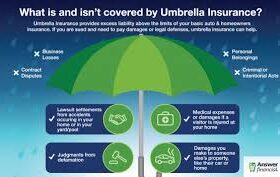Renters insurance coverage is like a safety net for your stuff. If something happens, like a break-in or a fire, it can
help replace your belongings. Plus, if you ever get sued, it can help cover your legal costs.
- Earthquake Insurance | How It Works
- AAA Auto Insurance Review 2024
- Scholarship To Croatia Without IELTS
- Fully Funded Scholarship To Netherlands
- Cadiff University PhD Scholarship
Also called tenant insurance or an HO-4 policy, renters insurance is similar to homeowners insurance, but it’s for people who rent instead of owning their home.
On average, it costs about $148 a year, or roughly $12 a month, according to NerdWallet’s analysis. Since it only covers your belongings and not the building itself, renters insurance is usually much cheaper than homeowners insurance.
Some landlords might ask you to get renters insurance before you can move in.
What Does Renter Insurance Cover
Here are some of the things that renter insurance can cover for you
1. Personal Property
Personal property coverage in renters insurance helps you get reimbursed if your belongings are damaged or stolen due to specific events. These events include things like fires, theft, vandalism, or even a volcanic eruption. Your coverage also extends to incidents like accidental water damage or damage caused by vehicles or aircraft.
Whether your stuff is at home or you’re out and about, your renter’s insurance has your back. For example, if someone steals your bike while you’re shopping, your policy will help cover the cost — although there are a couple of things to keep in mind. First, you’ll have to pay your deductible. Second, there might be a limit on how much coverage you have for things stolen outside your home, usually around 10% of your total personal property limit.
Here’s an example: Let’s say lightning strikes your apartment building and causes a fire that damages your living room furniture and electronics. Your renter’s insurance would cover the cost of replacing those items, minus your deductible.
2. Additional Living Expenses
If you can’t stay in your home because of a disaster that your renter’s insurance covers, your policy usually pays for you to stay somewhere else while repairs are being done. This coverage can help with things like hotel bills and extra expenses you have while you’re displaced.
For example, let’s say there’s a fire in your apartment and you have to move out for a couple of weeks while it’s being cleaned and fixed. Your insurance can help cover the cost of staying in a motel during that time. It can also help with the extra money you spend on meals since you can’t cook at home like usual.
3. Liability Insurance
If someone gets injured in your rental and decides to sue you, it could mess up your finances for a long time. But don’t worry, because the liability part of your renter’s insurance has got your back. It helps cover the costs if someone else gets hurt either in or around your place. (Just so you know, if you get into a car accident and someone gets hurt, your auto insurance takes care of that.)
Renters liability insurance also steps in if you or your family accidentally damage someone else’s stuff.
Now, let’s say your dog bites someone. Your renter’s policy might pay for that, but some insurance companies don’t cover dog bites or certain dog breeds. It’s a good idea to check with your agent to make sure your furry friend is covered.
If someone decides to sue you, your renter’s insurance can help with legal expenses and any money they’re awarded.
For example, let’s say you start running a bath but then get caught up in a fight between your kids. By the time you remember the bath, it’s overflowed and water has leaked through the ceiling, ruining your neighbour’s fancy leather sofa. Your downstairs neighbour sues you, but your renter’s insurance can help cover your legal fees and the $2,000 your neighbour gets for the damaged couch.
4. Medical Payment
This coverage is similar to liability insurance because it pays for injuries that happen on your property. But there’s a key difference: Medical payments coverage will pay for medical expenses no matter who caused the injury, while liability insurance only pays if you’re considered to be at fault. Plus, liability coverage usually has higher limits.
For instance, let’s say a friend comes over and trips over your son’s toy truck, hurting her wrist. It’s just a sprain, but your medical payments coverage can help cover the cost of her X-ray and urgent care visit.
Operational Renters Coverage
Besides the basic coverage we talked about earlier, you can usually add extra protection to your policy by paying a bit more. Here are some common options:
Replacement cost coverage
Normally, if something gets damaged, your insurance pays you based on what that item was worth at the time. So, if your old sofa gets ruined, you might only get enough money to buy another old sofa. But with replacement cost coverage, you get enough money to buy a brand-new replacement.
Scheduled personal property
Your renter’s insurance might have limits on how much it’ll pay for expensive stuff like jewellery or electronics, especially if they get stolen. But if you’ve got things that are worth more than what your policy covers, you can add extra coverage for them.
For example, if you inherit a fancy diamond ring, your insurance company might want to know exactly how much it’s worth before they give you extra coverage for it. That usually means taking the ring to a jeweller to get it appraised and then paying a little more to add it to your policy.
Water backup coverage:
This covers you if your sink, toilet, or any other drain backs up and floods your place with water.
Pet damage liability
If your pet tends to make a mess, like having accidents or scratching up the walls, you can add this coverage. It helps pay for cleaning or fixing up the damage, so you don’t have to worry about losing your security deposit when you move out.
Identity theft coverage
Some insurance companies offer this as an option. It helps cover the costs if someone steals your identity, like paying for credit monitoring services, legal fees, or getting new documents.






